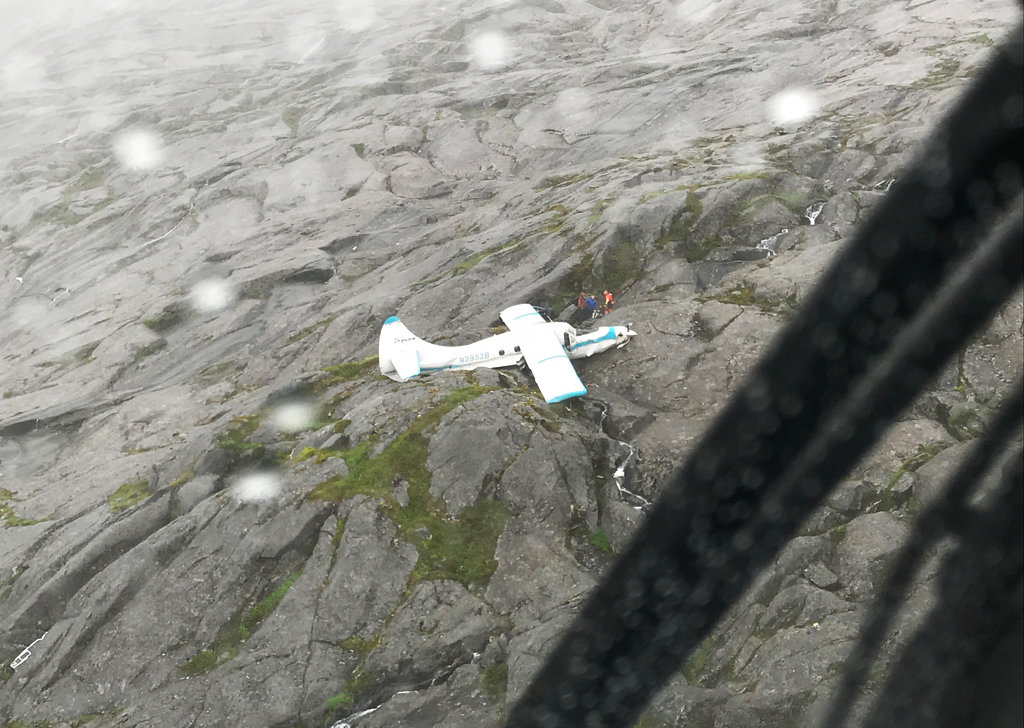JUNEAU, Alaska — Ginny Hacker Eiseman had spent the weekend reeling in a bounty of colorful fish at Steamboat Bay Fishing Club on remote Noyes Island in southeast Alaska. She was returning home to Ketchikan when the unthinkable happened.
The chartered Taquan Air flight that she and 10 others were on crashed Tuesday on a rocky mountainside near Ketchikan. All survived and were rescued hours later by the U.S. Coast Guard.
“For those wondering I’m alive,” she posted on Facebook after the rescue, noting that another woman with her was alive, too.
Coast Guard Petty Officer Charly Hengen said the downed aircraft had an emergency locator that aided a search effort complicated by visibility of roughly one-quarter mile.
The crash occurred on Prince of Wales Island, southwest of Ketchikan, according to the Coast Guard. The heavily forested island near the southern tip of the Alaska Panhandle is the fourth-largest island in the U.S. At 2,577 square miles (6,675 square kilometers), it’s larger than Delaware.
Eiseman, a holistic health coach, expressed gratitude and even disbelief that they were found. She said the fog “was crazy.”
“Those brave men put their lives on the line for us and it was so incredibly dangerous,” she wrote on Facebook. “I know that we would have never lasted the night up there. They went above and beyond and I’ll be forever thankful that I am alive and was able to hug my family tonight.”
Those on board the plane — 10 passengers and a pilot — were brought to a staging area, where they were assessed. All initially were taken to PeaceHealth Ketchikan Medical Center, though four were transferred to Seattle for further care, said Mischa Chernick, communications manager for the Ketchikan hospital.
Chernick could not provide details on the nature of the injuries, citing privacy rules. She said by email that six others from the plane were evaluated and released and that one was admitted to the hospital and was in fair condition.
The Coast Guard Tuesday said all on board the float-equipped de Havilland Otter were reported to have received minor injuries.
Eiseman praised the medical team who tended to her, including nurses and the doctor who “did a wonderful job with all the stitches and digging out pieces of metal.”
“To the CAT scan tech who was amazing because I couldn’t stop shivering and chattering my teeth and warmed the room up for me and was so kind,” she wrote. “To Ethan the amazing lab tech who has a gift of getting blood painlessly out of cold dehydrated veins.”
Eiseman, contacted by text message Wednesday, declined to speak to The Associated Press until the investigation is complete.
Taquan Air has said it is cooperating with investigating agencies. The company said the flight was a private charter.
Clint Johnson, with the National Transportation Safety Board in Alaska, said an investigator was interviewing Taquan officials and the pilot. A preliminary report on the incident was expected in the coming days.
Alaska State Troopers identified the pilot as Mike Hudgins of Ketchikan. Hudgins made the news in 2016 for rescuing a dog swimming in a busy channel.




